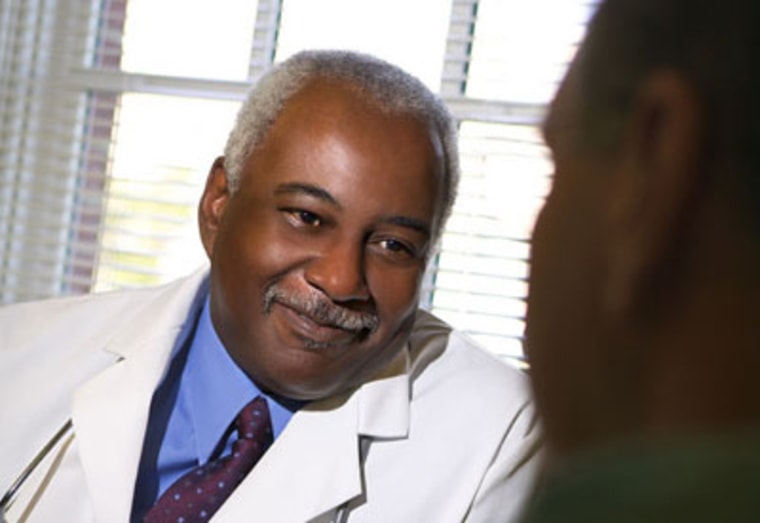At the age of 53, Joe DiBlasi, a music composer and producer who had worked with such artists as Frank Sinatra, considered himself a healthy man.
He was in great physical shape and ate a fairly typical diet. And, like many men, he avoided seeing doctors — he'd managed to go without a checkup or medical test for 15 years, until his wife, Lisa, decided it was time for an appointment.
"My wife is the reason why I'm alive today," DiBlasi says. "She said it's time for a physical, and she wouldn't budge until I went for one."
During the physical, DiBlasi seemed to check out fine. But when the results of a blood test came back, his PSA (prostate-specific antigen) levels were at 10.4 — a bad sign, since anything above 4 is suspected to be prostate cancer.
"It was a shock, because I thought when you have cancer, you feel it," he says. "In this case, I had no symptoms at all."
It's an unpleasant topic, but an important one. More men than ever are being diagnosed with prostate cancer in the United States. According to the Prostate Cancer Foundation in Santa Monica, Calif., more than 234,000 men will be diagnosed with the disease this year, and about 27,000 will actually die from it.
Many men wisely research the disease once they know they have it, but it's even smarter to have a few facts on file beforehand.
Schedule regular visits to the doctor, for example. It's not fun, but it's increasingly necessary as men get older. The risk of getting prostate cancer goes up as you age, so checkups should be scheduled annually after age 50 — earlier if you have specific risk factors.
Know your options
There are many treatment options for prostate cancer, ranging from doing nothing at all to drug or hormone therapy, to surgery and radiation, all of which can be done alone or combined. Better to know that ahead of time, so you won't be steamrolled by medical experts.
"When the doctor told me I had cancer, he just hit me with both barrels between the eyes," says DiBlasi, whose priority was living to see his children grow up. "He said I could do nothing and die, or (do) radiation, but there's no guarantee it will stop the cancer. He then said the best choice was a radical prostatectomy — where they go in and remove the prostate."
Many men choose to have the surgery, but DiBlasi was taken aback, because he hadn't had time to process what was happening. His doctor scheduled the appointment before DiBlasi had done any research, and because DiBlasi was worried, he agreed to it. Luckily, he asked for the surgery to take place a few months later, and in the meantime, he set out to find a treatment that would work for him and the doctor who would best do the job.
"Most patients become frightened when they find out they have cancer and naturally equate that the more aggressive therapies result in better cure rates," says Dr. Brian Moran, a radiation oncologist at Chicago Prostate Cancer Center in Westmont, Ill. "But in fact, there is no data that has proven that. Appropriate assessment should include a very thorough discussion regarding benefits and risks as it applies to a specific patient. Our goal is to eliminate cancer without negatively impacting a patient's quality of life."
Find the right doctor
Choose a doctor who is skilled at helping patients make the appropriate decisions for their situation and lifestyle. And, advises Dr. Erik Klein, a urologist at the Cleveland Clinic, for the best outcome, choose one who is highly experienced.
"This is best documented for surgery," he says. "For a surgeon who has worked on more than a thousand patients versus one who has done about 250 or fewer, there is about a 30 percent difference in cure rate."
Dr. Richard Stock, a radiation oncologist at Mount Sinai Medical Center in New York City, adds, "The patient has a right to ask a doctor how many treatments does he do a year and what are the results. It all pertains to volume and experience of the doctor."
After doing extensive research on the Internet and asking friends for advice, DiBlasi decided surgery would be his best option. But instead of going with his first doctor, he interviewed a dozen. He settled on Dr. Alexander Gershman, a urologist and founder of the Institute for Advanced Urology in Los Angeles, where he administers a new treatment called robotic laparoscopic prostatectomy, a minimally invasive surgery that uses a robot to remove the prostate gland.
"With the traditional prostatectomy, they open you like a turkey," DiBlasi says. "The other procedure makes four small incisions and one tiny one near the navel. That sounded way better to me."
DiBlasi had his surgery on April 5, 2006, and only spent a day and a half in the hospital. He went back to work after about a week, and he was at the gym three weeks later. Since then, his PSA level has been at zero. Though he must continue be checked every three months for the next five years, he is completely cured of the disease.
"He was like a charm," Gershman says. "I said his chances were about 90 percent that he would be cured. Now, he's completely continent and back to normal."
